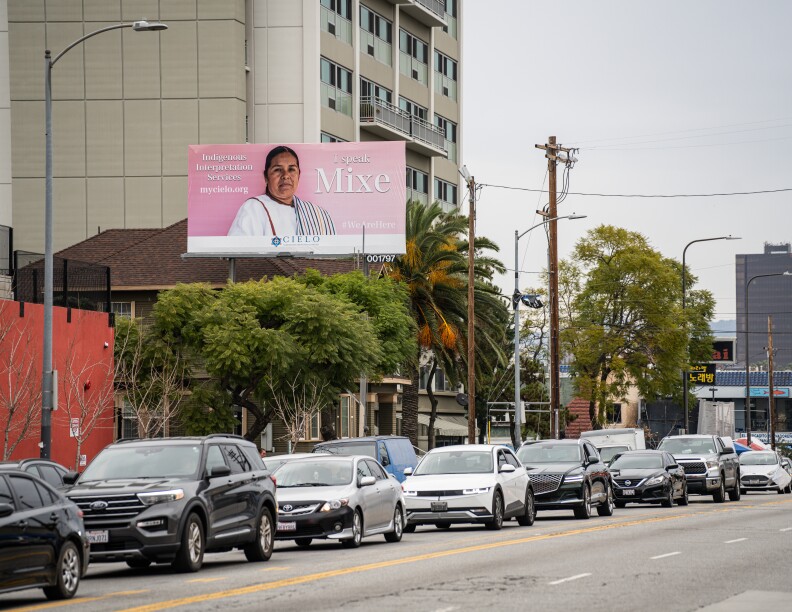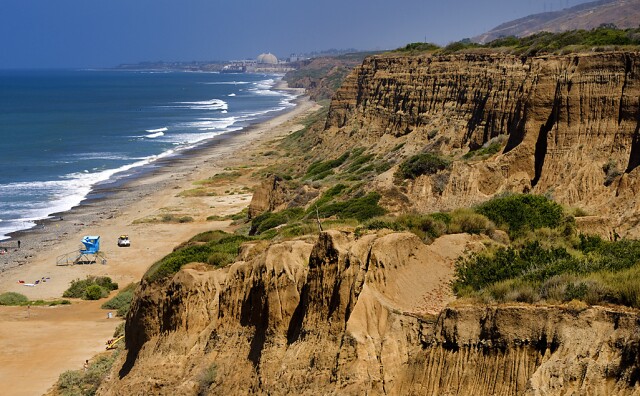Fighting For Recognition: How New Billboards Seek Visibility For LA’s Indigenous Migrants

A new billboard campaign in Los Angeles highlights Indigenous migrants from Latin America, along with the many Indigenous languages they speak. Both have long been overlooked by local institutions, even within Latino communities.
The eight billboards, unveiled this week by a local Indigenous advocacy non-profit, feature portraits of people from Indigenous migrant communities in L.A. with messages with that read “I speak Mixe” or “I speak Zapoteco.”
“Usually when people think about Latinidad, they think that people automatically speak Spanish,” said Janet Martinez, co-founder of Comunidades Indigenas en Liderazgo, known as CIELO.
But that’s not the case. Martinez said her organization, which advocates for Indigenous language and other rights and provides interpreters for courts, hospitals and schools, has identified around 17 different Indigenous languages from Latin America that are spoken locally.
-
At magnitude 7.2, buildings collapsed
-
Now spinning in front of Santa Monica apartments
-
Advocates seek end to new LAUSD location policy
She said one major purpose of the campaign is to change that misperception, and raise awareness of L.A.’s Latin American language diversity among local institutions and service providers.
“It's really a campaign to bridge the gap that a lot of service providers have when it comes to knowing that maybe people that are identified as, or categorized as Latino, that they also speak another language,” Martinez said.
That, and to recognize and make visible a population that’s often overlooked and discriminated against, even within Latino communities.
‘We’re having this conversation’
This came to the forefront in the fall of 2022, when leaked audio emerged of three Los Angeles City Council members, all of them Latino, engaging in racist and anti-Indigenous banter that, among other things, belittled Indigenous Mexicans from Oaxaca.
The news angered L.A.’s Indigenous Mexican and Central American communities. Some also hoped it would become a teachable moment that could lead to real change — like better representation of Indigenous Latin American communities in local institutions, and better in-language services in health care, educational and government settings.
There has been some movement in the right direction, said Gaspar Rivera-Salgado, a UCLA sociologist who directs the school’s Center for Mexican Studies.
“There are many different areas that we still need to grapple with, but at the very least, we're having this conversation,” said Rivera-Salgado, who identifies as Mixtec from Oaxaca. “I think the Indigenous migrant community is even more active and more assertive, and I think that's a good sign.”

The billboard campaign coincides with the recent re-introduction of a California bill that seeks to collect disaggregated Latin American Indigenous health data. Gov. Gavin Newsom vetoed a similar bill last year.
“Currently, there is no option to recognize this demographic that is often lumped with … Latino data, but who do not identify as Latino ,” said Mar Velez, policy director with the Latino Coalition for a Healthy California, which backs the proposal.
Janet Martinez with CIELO said she’s seen more of a willingness at the local level to include Indigenous migrant communities, but that there is much more work to do, especially in terms of language equity.
“I think we definitely need to kind of bridge that education gap and have hospitals or different services understand the communities that they serve, in order to provide interpretation services that they need,” said Martinez, who identifies as Zapotec and is the daughter of Mexican-born parents from Oaxaca.
To that end, the billboards are placed strategically, she said; each is in a neighborhood where the Indigenous language and identity on that particular billboard represents residents in the surrounding community.
The billboards are set to remain up through April 21.
-
The severe lack of family friendly housing has millennial parents asking: Is leaving Southern California our only option?
-
As the March 5 primary draws closer, many of us have yet to vote and are looking for some help. We hope you start with our Voter Game Plan. Since we don't do recommendations, we've also put together a list of other popular voting guides.
-
The state's parks department is working with stakeholders, including the military, to rebuild the San Onofre road, but no timeline has been given.
-
Built in 1951, the glass-walled chapel is one of L.A.’s few national historic landmarks. This isn’t the first time it has been damaged by landslides.
-
The city passed a law against harassing renters in 2021. But tenant advocates say enforcement has been lacking.
-
After the luxury towers' developer did not respond to a request from the city to step in, the money will go to fence off the towers, provide security and remove graffiti on the towers.






